
An Interview with Mikey Stevens by Olivia Cole
There are so many ways to experience the world—vacationing for a week, backpacking for months, or giving your time to a cause that matters. For Mikey Stevens, one of Turbulent Mind’s ambassadors, it was the latter that drew him back to the island of Bali.
Earlier this year, Mikey returned to volunteer with the Suwandi Foundation, a grassroots program located in the Karangasem region—one of the areas in Bali most affected by poverty and low literacy rates. The foundation’s mission is to uplift the next generation by providing access to education, resources, and opportunity. Their goal? Empower children to build their own futures.
We had the chance to chat with Mikey about his experience with the Suwandi Foundation. If you’ve been thinking about volunteering—and just need that final nudge—let this be it.
What inspired you to volunteer with the Suwandi Foundation?
My first time in Bali, I worked with the North Bali Reef Conservation project. I spent five months immersed in the local culture, and I was struck by the deep spirituality and community-mindedness of the Balinese people. That connection made me want to come back—but this time, I wanted to contribute in a way that felt even more meaningful.
I met Lily and Kaitlynn—two of the incredible women behind Suwandi—during that first trip. Their dedication to ethical and sustainable change really stuck with me. The love and respect they show for the local culture is something rare and beautiful. Working with them felt like a no-brainer.
Another huge part of what inspired me was seeing how central local leadership is to the foundation. The team on the ground—people like Lia, Putu, and Agus—are the heart of the mission. It’s their passion and vision that truly drives this forward.
What kind of work does the foundation do?
The Suwandi Foundation uses education to break the cycle of poverty. They focus on supporting local leaders and grassroots projects—like the building of Yayasan Loka Mawa Upadhi, a community learning center that opened in May 2023.
The center provides kids with a safe, inspiring space to be themselves—learning English, computer skills, and exploring hobbies like gardening and sports. It’s not just about schooling, it’s about childhood, connection, and confidence.
I helped out as an English teaching assistant. I worked with a local teacher, Suadi, who runs the middle school classes year-round. My job was to bring some energy and fun to the classroom—making learning something the kids genuinely looked forward to.
What did a typical day look like?
I’d wake up around 8 AM and head to the kitchen for breakfast (shoutout to the banana pancakes). Mornings were usually spent on cultural activities—everything from traditional ceremonies to language classes. These experiences helped us connect more deeply with the community we were working with.
After lunch, we’d prep for class and head to the learning center by 2:30. From 3 to 5, we’d teach English, then spend another hour playing games or doing full-group activities with the students.
Evenings were all about winding down, chatting, and sharing meals with other volunteers. Chicken satay in peanut sauce? Absolute favorite.
What was the most rewarding moment?
There were four girls who joined our class a bit later than the rest. At first, they were shy and quiet—especially struggling with English compared to their classmates. But by the end of our month together, they were standing at the front of the class, writing on the board, laughing, and helping each other learn.
Watching them grow more confident every day was incredible. It made me realize just how powerful education can be—not just as a tool for learning, but for building belief in yourself.
Any unexpected challenges?
I wouldn’t call them challenges as much as lessons in humility. Being in a new culture means learning a new way of being. For example, in Bali, height is tied to respect—you don’t sit above someone older than you, and you never touch someone’s head. Little things like that hold deep meaning here, and learning to honor them is part of what makes the experience so enriching.
How did this experience shape your view on volunteering?
I’ve worked with other programs before, but the Suwandi Foundation stands out. It’s not just about volunteers “helping”—it’s about listening. Their motto is “listen more, talk less,” and they live by it. This isn’t a story of outsiders saving anyone. It’s about locals leading the way, and volunteers supporting those visions with humility and care.
If you’re considering volunteering, do your research. Ask yourself why you’re going, and what you hope to give andreceive. The experience should challenge you, but also change you—for the better.
What advice would you give to someone thinking about volunteering abroad?
Learn the history and culture before you go. It’ll change how you show up. Even small gestures—like learning a few words in the local language—can go a long way.
And remember, this isn’t a holiday. You’re there to give your time, your energy, and your heart. Be ready to work, to learn, and to grow. I promise—it’s worth it.
Would you volunteer with Suwandi again?
Absolutely—again and again. I plan to keep fundraising and supporting them however I can. The connections I made with my fellow volunteers, my students, and the local team—especially people like Suadi and our coordinator, Pratt—will stay with me forever.
And while I’m currently traveling and headed to Australia next, I’ve also got dreams of one day volunteering with animals. We’ll see where life leads.
Feeling inspired? Check out the Suwandi Foundation to learn more about their work and how you can support their mission—whether by volunteering, donating, or simply spreading the word.
Adventure, purpose, and impact—it’s all out there waiting.










